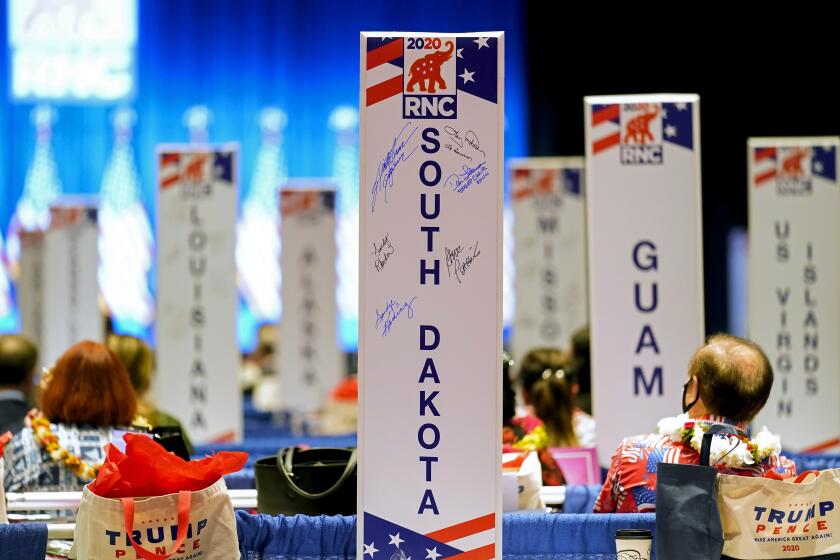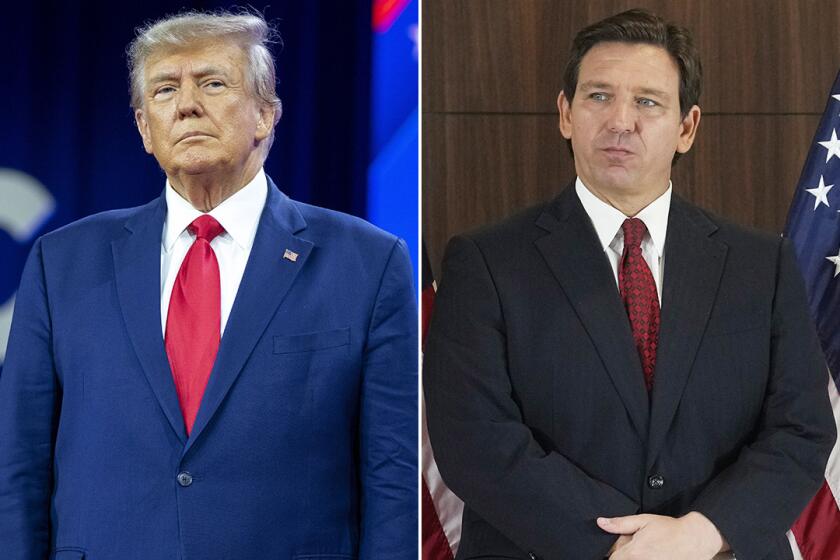Tensions flare as California GOP gives Trump a boost by overhauling state primary rules
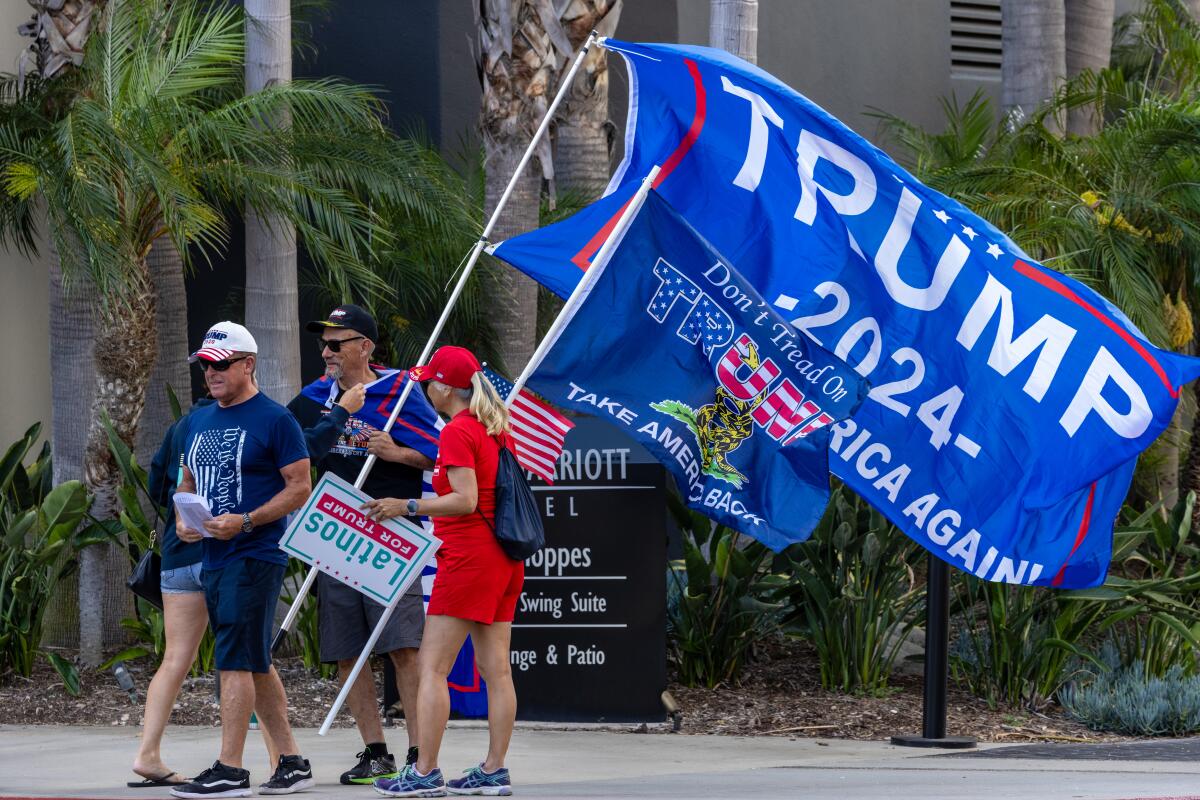
- Share via
In a move backed by former President Trump’s campaign, the California Republican Party on Saturday changed its rules for allocating delegates in the state’s presidential primary — a shake-up that could discourage other GOP candidates from campaigning here and make the state less competitive in next year’s nominating contest.
Tensions flared as the California GOP’s executive committee approved the plan, with some pro-Trump demonstrators denouncing the move, police getting called and two factions nearly coming to fisticuffs.
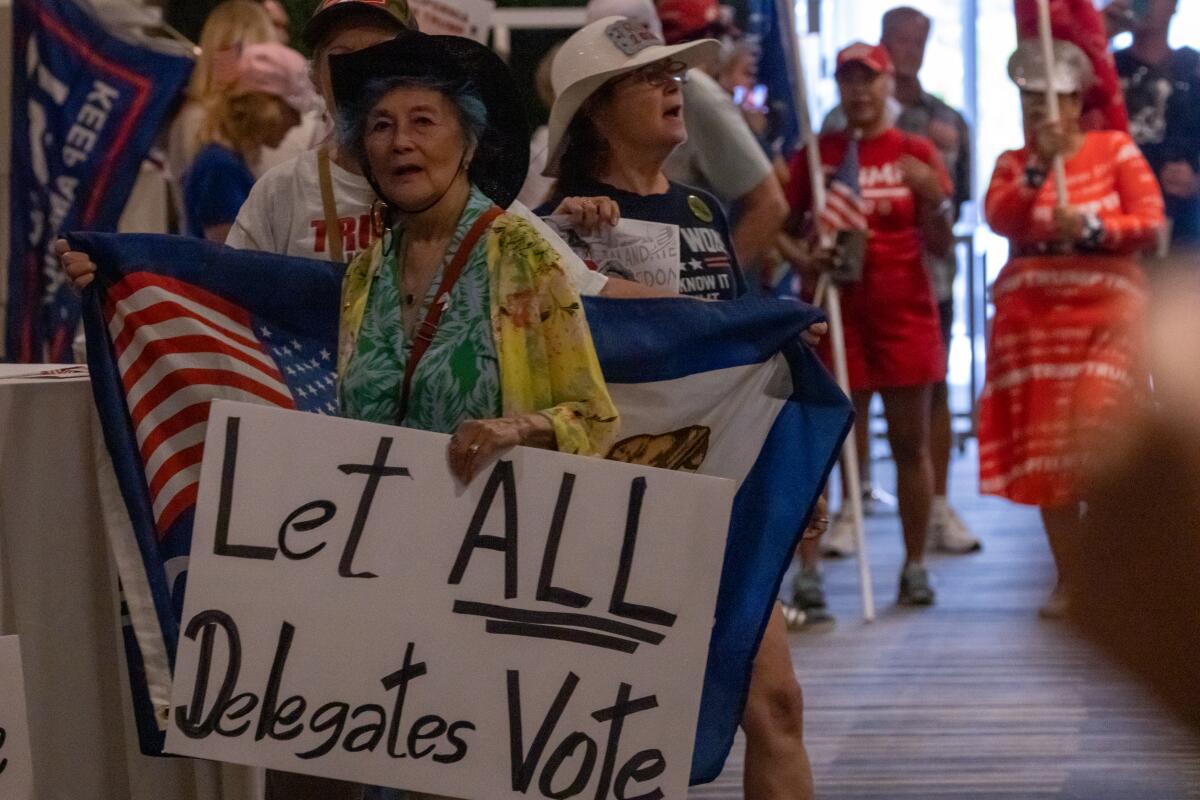
Although demonstrators argued that the state party leadership was trying to undermine the former president, the decision by the California GOP’s executive committee reflects a concerted effort by the Trump campaign to mold state party rules across the country to benefit his candidacy.
The Michigan Republican Party also recently changed its rules for awarding delegates in a way that’s expected to benefit Trump. Republicans in Idaho, Nevada, Louisiana and Colorado are considering other measures that could give Trump an advantage.
Donald Trump’s Republican presidential rivals appear to be at a disadvantage in the battle for delegates who will determine the party’s 2024 nominee.
The new rule in California means a Republican presidential candidate who receives more than 50% of the vote in the March 5 primary will win all 169 delegates from California, which has more than any state in the nation. If no one reaches this benchmark, delegates will be awarded proportionally based on the statewide vote.
State party leaders argued that the new plan would draw candidates to compete in California.
“Today’s vote ... was a massive victory for California Republicans who are eager to have a say in deciding who our Party’s 2024 presidential nominee will be,” state party Chair Jessica Millan Patterson said in a statement.
“Republican presidential candidates will not only be encouraged to spend real time campaigning in our state and making their case to voters, but Republican voters will equally be encouraged to turn out to support their chosen candidate to help them win delegates,” she added
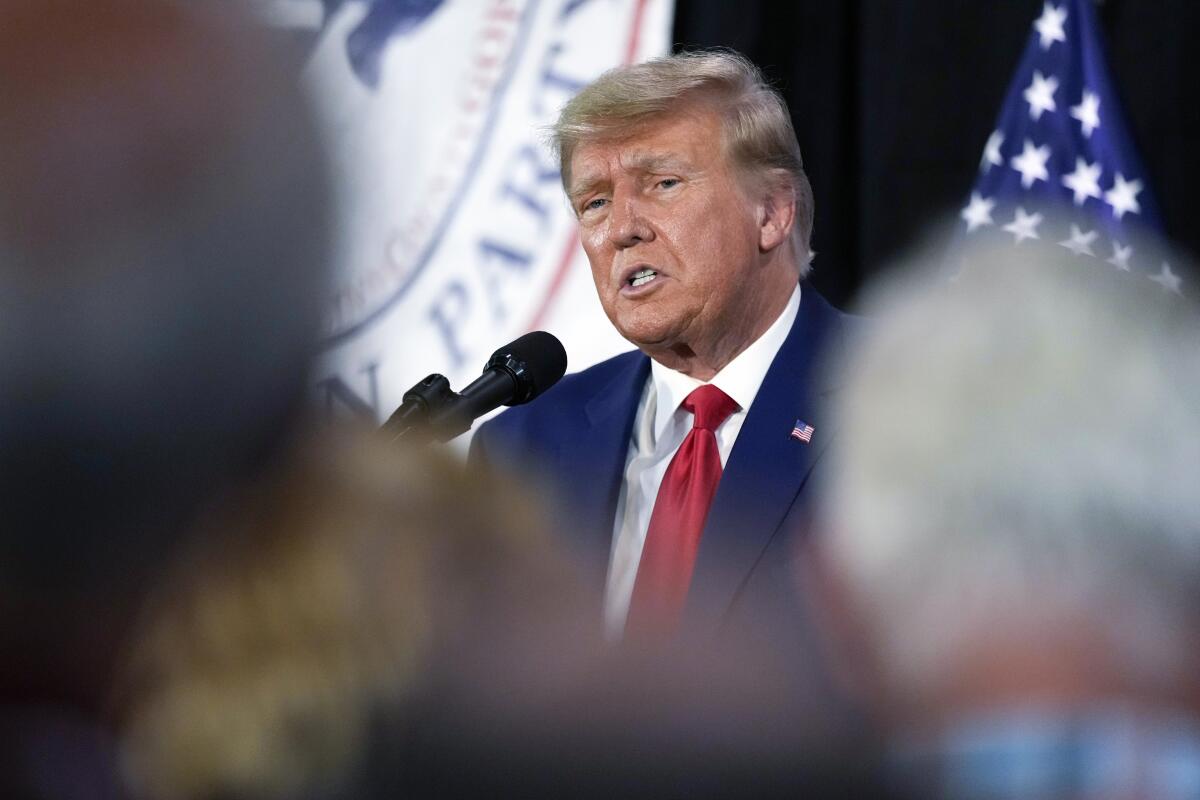
But other Republicans say the plan will instead make California less competitive than if the party had stuck with some version of the system it has used for much of the last two decades, in which three delegates were awarded for each congressional district won, said Jon Fleischman, who was executive director of the state GOP in 2000, when it adopted this plan (though it didn’t go into effect until after the 2004 election).
Such a system allows a candidate to strategically target a handful of areas instead of trying to campaign and advertise in an enormous state with some of the most expensive media markets in the nation.
“The net effect of passing this proposal will be no presidential campaign will be incentivized to do any campaigning in California, period,” Fleischman said. “The cost to advertise statewide is too great and the impact of trying to motivate volunteers is too small. So they will go to other states and ignore California in the primary, as they ignore California in the general election.”
Trump’s campaign supported the plan because polling shows he can win more than half the votes in California’s GOP primary, allowing him to sweep up the state’s huge haul of delegates, according to an executive committee member who had spoken with a campaign official.
Trump strategists also believe a previous proposal — that the California GOP scrapped — could have helped Florida Gov. Ron DeSantis, said the executive committee member, who spoke on the condition of anonymity to talk candidly about the insider conversation.
Under that system, delegates would have been awarded by congressional district, with two going to the winner in each district and one delegate going to the second-place finisher. California is so big, with 52 congressional districts, that such a system would have created an enormous “consolation prize” amounting to more delegates than those awarded by multiple other states combined.
Ken Cuccinelli, founder of the pro-DeSantis Never Back Down super PAC, blasted the state GOP’s decision to go the other route.
“Smoke filled back rooms do not reflect the will of or benefit voters in any state. Yet across the country games are afoot to enhance the potential outcome of primary elections for one former president who half of the Republican electorate no longer wants as the party leader,” said Cuccinelli, a former Virginia attorney general who served in the Trump administration, in a statement.
But “even with these asinine primary rules changes,” he added, “we remain confident Governor DeSantis will become the Republican nominee and 47th president of the United States.”
The Trump campaign did not respond to a request for comment.
After trailing Florida Gov. Ron DeSantis three months ago, former President Trump now has a commanding lead as California Republicans’ choice to be their 2024 presidential nominee.
Had it not changed its rules, the California GOP would have lost half of its delegates to the Republican National Convention — a huge blow to the state’s clout. Either of the plans that were considered would have met the national party’s requirements for sending a full delegation.
California’s 2024 primary is scheduled for Super Tuesday on March 5, along with contests in more than a dozen other states. While California’s overwhelmingly Democratic tilt has long made it uncompetitive for Republican presidential nominees in general elections, the state could play a significant role in deciding the next GOP nominee — particularly if a candidate doesn’t take a commanding lead in earlier contests in Iowa, New Hampshire, Nevada and South Carolina.
By the time California votes in the spring, Trump could be under indictment in four separate criminal cases. He has already been charged in connection with an alleged hush money payment to an adult-film star in the final days of the 2016 campaign, and with mishandling and illegally possessing classified documents at his Florida home after his presidency ended.
Trump is also being investigated in Georgia on allegations that he attempted to overturn his 2020 loss in the crucial state to Democrat Joe Biden; and federal prosecutors have targeted the former president in an investigation into other efforts to keep him in office, including the Jan. 6, 2021, attack on the U.S. Capitol.
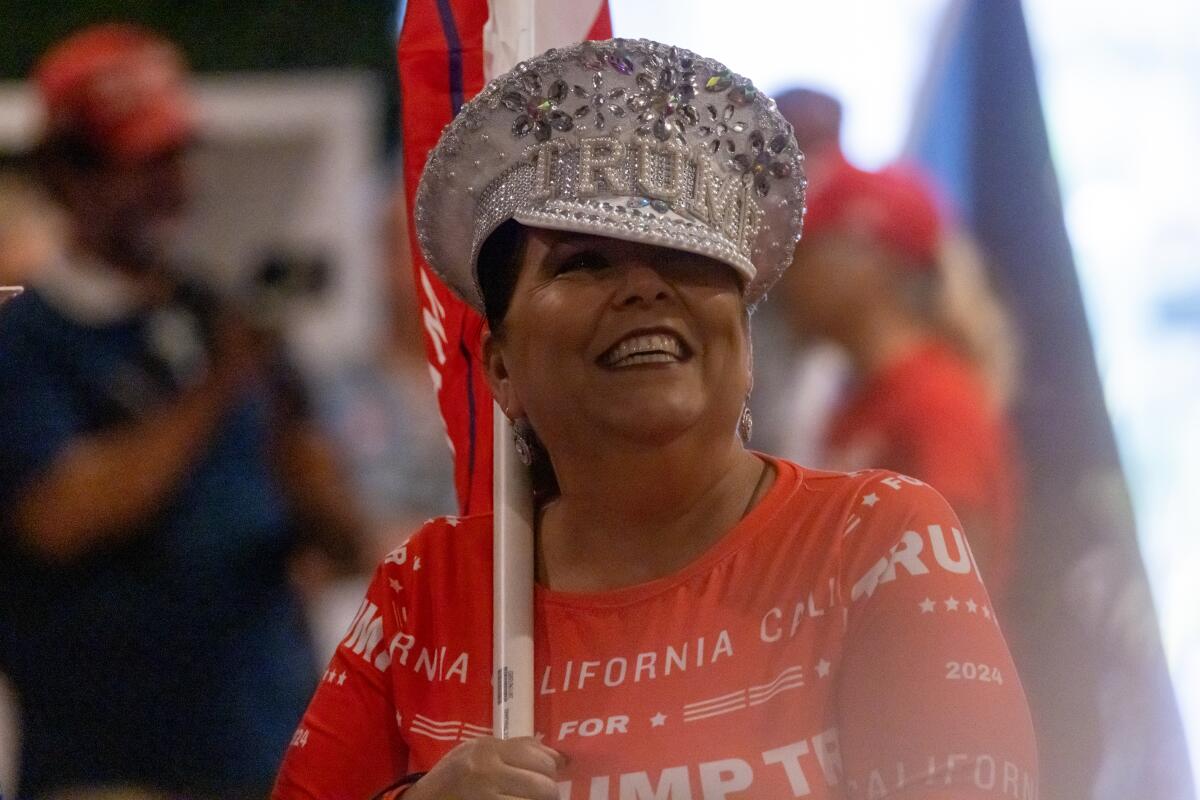
But Trump’s legal issues have not dampened support from his base — including the more than 50 supporters who staged a protest at the Marriott hotel in Irvine on Saturday morning.
The protesters saw the California GOP’s earlier proposal as a purposeful effort to harm Trump, and remained angry that a decision was being made by the party’s 100-member executive committee rather than by more than 1,400 members at their fall convention — a reflection of the distrust of party leadership among conservative activists across the country. They unsuccessfully pushed for a candidate having to receive a certain percentage of the vote to be awarded any delegates.
“There’s a part of me that does think that maybe they’re trying to take votes away from Trump, specifically, who’s coming in strong, and so they’re kind of thinking, ‘What can we do to take away votes for Trump?’” said Bonnie Wallace, president of the Greater Pasadena Republican Assembly. As a state party delegate, she was able to observe the committee meeting, which was closed to the media, but she was unable to vote on the matter.
“What I heard in there is, ‘Oh, we need to open this up so all the candidates are welcome. ... If they get 5% of the vote, they’ll get something,” added Wallace, who carried a sign that read, “CAGOP & RNC/Why not Trump? Stop supporting corruption!” “You know, we need to whittle things down. We don’t have participation trophies.”
The executive committee approved the delegate allocation plan on a 53-16 vote. State party officials said they could not wait for the convention to debate the matter due to a tight deadline for submitting plans to national Republicans.
The protest was driven in part by fury and confusion sowed on social media, where far-right activists argued that Millan Patterson and House Speaker Kevin McCarthy of Bakersfield, who effectively controls the state party, were trying to derail Trump’s candidacy.
“They are trying to change the laws so they can orchestrate a brokered convention at the National convention and steal the GOP nomination from Donald Trump,” Laura Loomer, a Trump supporter from Florida who has a history of spreading conspiracies to her large online following, wrote on Twitter on July 20. “We can’t allow [Millan Patterson] and [McCarthy] to get away with their deceptive rule changes that are designed to screw Donald Trump.”
Millan Patterson and McCarthy did not respond to requests for comment on the accusations.
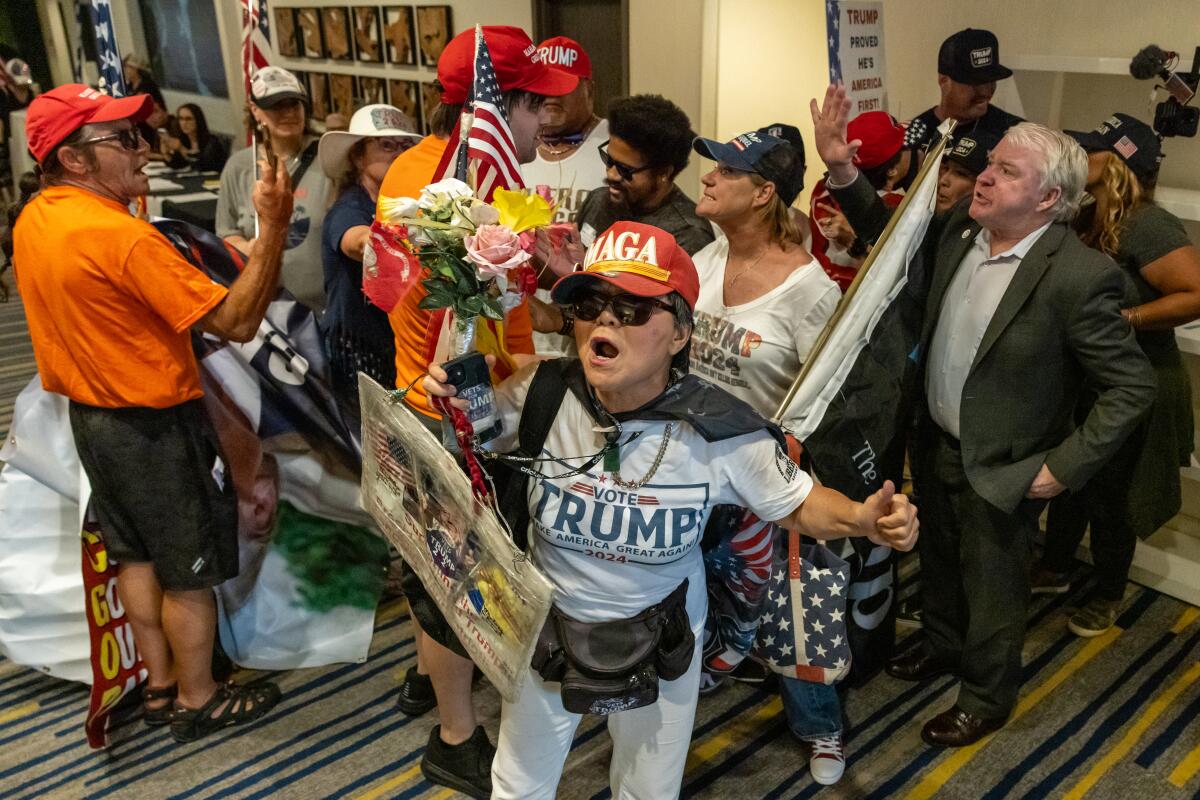
Protesters wearing red “Make America Great Again” caps and carrying American, Trump and “Don’t Tread on Me” Gadsden flags gathered outside of the committee meeting, chanting Trump’s name and “America first!”
After they tried to enter the meeting and were blocked by security guards, Irvine police officers showed up and tried to cool emotions.
Later, two pro-Trump factions began screaming at each other, with one side accusing the other of being white nationalists and the other responding that their foes supported open borders. They started jostling with one another and nearly came to blows before other protestors stepped between the two groups.
Anna Bryson of Laguna Niguel, an executive committee member, was inside the meeting room but knew something problematic was occurring outside when she heard raised voices and then saw security guards race out of the room.
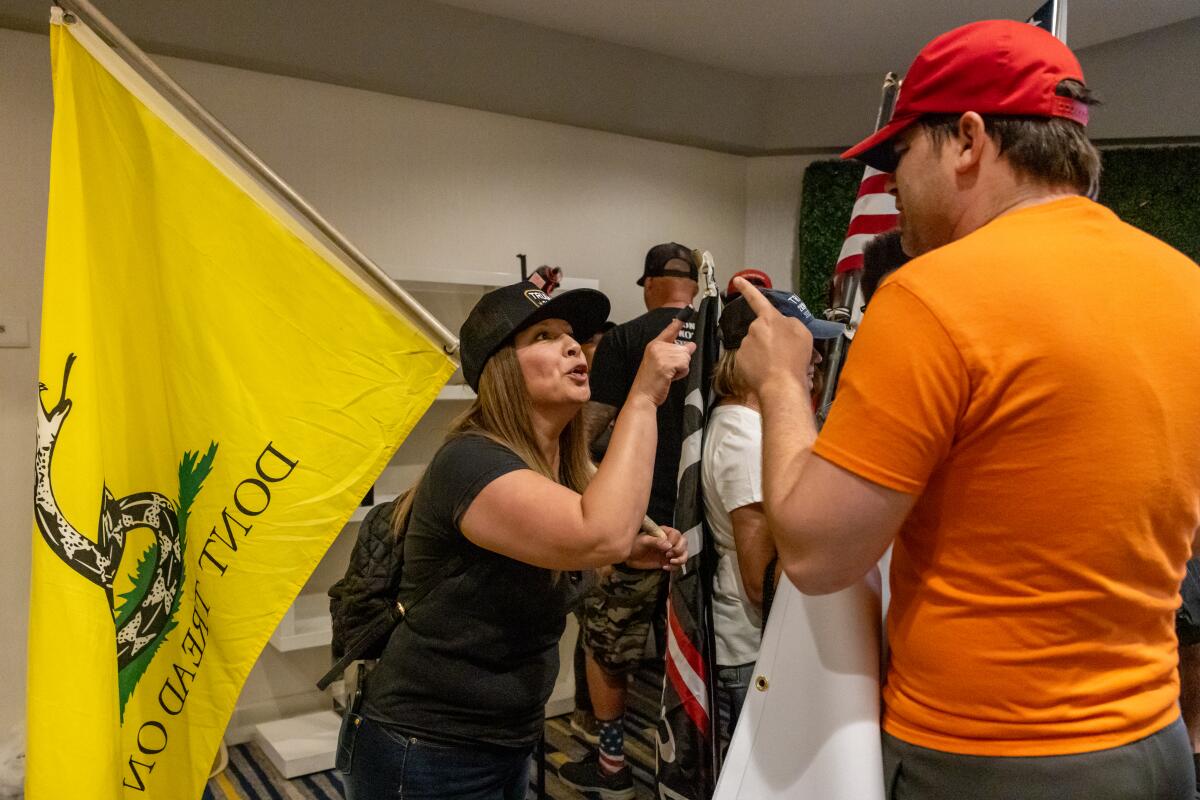
“We have to fight for a vote at the polls. Not one another. Focus, people,” said Bryson, who supported the rule change.
“Get your friends and neighbors out to vote for the Republican Party,” she continued. “And if you all are fighting with one another, you’re not out there going door to door and talking about our great candidates.”
More to Read
Get the L.A. Times Politics newsletter
Deeply reported insights into legislation, politics and policy from Sacramento, Washington and beyond. In your inbox twice per week.
You may occasionally receive promotional content from the Los Angeles Times.

